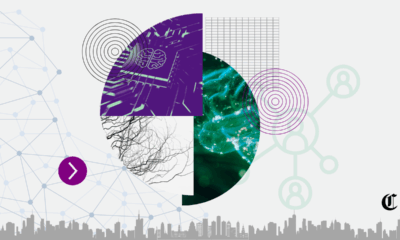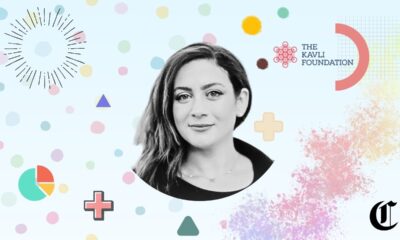Stories in Science Special Series
I Thought Only Neurologists Could Study the Brain
Kathryn Bonnen: “The realization that I was not alone put me on a path to recovery that has allowed me to truly enjoy science again.”

Kathryn Bonnen
[su_boxbox title=”About”]Kathryn (Kate) Bonnen is a post-doctoral research fellow at the Center for Neural Science, New York University (NYU), working with Dr. Eero Simoncelli and Dr. Michael Landy. She studies visual perception, the brain, and the coordination of sensory and motor systems (an area of research that has taken her on a few more hikes than she was expecting.) She holds a Ph.D. in neuroscience from the University of Texas and dual bachelor’s degrees in psychology and computer science from Michigan State University. One of the most important things she learned during all that time was how to grow her own vegetables, because they taste better that way (especially snap peas, peppers, and onions). If you’re looking for Kate, she can be found on nearby hiking trails, jumping into lakes, on a tennis court, or wherever the most delicious food is. In January of 2022, she will start her own lab at Indiana University in the School of Optometry. She looks forward to building a lab that is a supportive environment for all people to grow up in science; a place that they can bring their full selves to study, learn, teach and grow as human beings. Cover image courtesy of Gerd Altmann from Pixabay. The story below was edited by Katelyn Comeau.[/su_boxbox]
[su_boxnote note_color=”#c8c8c8″]Key Points:
- There is still so much we don’t know about how the brain works and how to help when there are problems. These mysteries are what draws many neuroscientists to study the brain.
- Your path through science, like your path through life, will not always be linear. But there is often much to be learned in the detours, so follow your curiosity when you can.
- As a community, we are only just beginning to acknowledge the mental health challenges that many of us face. It is vital that we continue to work to remove the stigma surrounding mental health disorders and provide better support to those in need of it.[/su_boxnote]

Dr. Kathryn Bonnen
An early interest in the brain
[dropcap]M[/dropcap]y name is Kate (or Katie if you ask my Grandma) and I was born and raised in Austin, Texas. I had my first seizure (yes, the falling-down, convulsing kind) when I was nine years old. I remember that day in vivid detail: I was waiting for my Dad and my brother in the front yard because we were going to the bookstore. As I stood waiting, it suddenly seemed as if the sun was flashing on and off like a light bulb, while my body launched into a cartwheel that my brain hadn’t requested. I remember thinking, “I don’t even like cartwheels!” right before everything went black. I woke up on the ground staring up at my Dad and little brother.
We didn’t go to the bookstore that day. Instead, I visited the pediatrician. I had a second seizure that included an unfortunate bout of projectile vomiting at a very busy post office, which led to my first ambulance ride. Not long after, I was diagnosed with epilepsy. The Mayo Clinic describes epilepsy as “a neurological disorder in which brain activity becomes abnormal, causing seizures or periods of unusual behavior, sensations, and sometimes loss of awareness.” [1]
For about two years after my first seizure, my epilepsy was well-controlled by an anticonvulsant called Tegretol. Then one day the seizures returned. Over a period of about 6 months the doctors performed tests and tried new medications to suppress the seizures. Nothing seemed to help, and the side effects of the new medications were pretty awful. Eventually, the doctors determined my epilepsy was gone. My brain activity was normal, even though I continued to have seizures. I still remember the explanation that my neurologist gave me: “Kate, I’m afraid your brain may have learned a bad habit.” I don’t think I responded to him, but I remember thinking, “Great, so are you going to put it in timeout or something?”
My doctors’ difficulties treating and explaining the cause of my seizures was a deeply frustrating experience.
The seizures did lessen over time and eventually stopped of their own accord before I started high school. During the years that followed, I read a lot about epilepsy, seizures, and the brain. I came to understand that there was a lot that doctors didn’t know about the brain. All of the unanswered questions left me dissatisfied. I wanted to study the brain when I grew up, but I thought the only way to do that was to become a medical doctor. And unfortunately, it became clear to me that I was far too squeamish to survive medical school. I had a tendency to pass out at the sight of needles and a significant problem with sympathetic vomiting. By the end of high school, I had put aside my interest in the brain and decided to study math at university with the goal of becoming a high school math teacher.
First an engineer, then a scientist
Halfway through my first year at Michigan State University, I accepted the reality I didn’t like my core math classes that much. I felt a little lost and I started to wander. I took classes and participated in activities that I found interesting, without much regard for which degree I might finish. I played varsity tennis, I studied the mathematics of voting systems, I worked in an education lab studying the development of counting in early childhood, I took my first programming course, I studied abroad in Peru, and I built solar power devices, water heaters, and a food dehydrator. I just did things that gave me joy and sparked my curiosity.
To say that I had a coherent plan through this part of my academic career is laughable. I would later write my graduate school applications as if this process of discovery was coherent and linear, but that was mostly a story I told for the benefit of others. Eventually, I chose computer science as my primary major and joined the College of Engineering. I enjoyed the process of applying mathematics and the tinkering involved in programming and engineering.
I spent my last summer of undergrad working as an intern at the Max Planck Institute (MPI) in Tübingen, Germany, in a lab that studied face perception. My primary responsibility was to write code to interface with their research database of 3D face images. But I was also invited to participate in research experiments around the institute and encouraged to ask questions. I informally shadowed graduate students doing everything from perceptual experiments and human imaging to neurophysiology and robotics.
In this rich intellectual environment at the MPI, I began to discover that I could use computer science and math to study the brain.
When I applied for PhD programs that Fall, I included some neuroscience programs on a whim. I was accepted into all the computer science programs and only one neuroscience PhD program. I made a gut decision and moved home to Austin to start my PhD in Neuroscience at the University of Texas.
The transition from engineer to scientist was bumpy. I was very good at building tools and writing code, but I had a lot of trouble understanding the scientific motivations for what I was working on. It took a couple years before I stopped feeling that I had made the wrong choice, but around 2-3 years into grad school, I settled on a dissertation project studying 3D motion processing. My two advisors, Alex and Larry, were incredibly supportive and didn’t seem to mind that I had a tendency to get distracted by a variety of side projects both inside and outside the lab.
And now a new set of challenges
I have been a postdoc in Neural Science at NYU for nearly two years now, and there’s a lot to say about this part of my life. I have been incredibly successful, but in the midst of these achievements, I have struggled with depression and imposter syndrome. And the reality is that I am not alone [2]. The many personal and professional transitions that we make as we begin in our postdoc positions, all while dealing with an uncertain future, leave us extremely vulnerable to mental health issues.
I was excited to embark on this new adventure in New York City, but I was moving to a place where I had no close friends or family. I was still recovering from a hip surgery that was intended to correct a structural problem causing chronic pain and I was only just starting to navigate coming out as queer at 30. Shortly after arriving in the city, I started experiencing insomnia. As I tried to work through the fog of exhaustion and depression, it was difficult to feel that I was making progress in my postdoc. I displayed classic signs of imposter syndrome. Each time something good happened [e.g., receiving the postdoc fellowship, or publishing the last part of my dissertation], I had trouble celebrating because it just felt like more pressure to prove myself. And the truth was that I wasn’t really enjoying science anymore.
I was also slow to seek help. A lot of what we learn in graduate school is how to push through even when it seems impossible. I wanted to believe that if I kept pushing that somehow everything would work out. But the truth is that you can’t push through mental health issues and you can’t begin to address those issues if you refuse to name them. It took a very frank conversation with another postdoc about her own journey with depression for me to realize just how far down the rabbit hole I had fallen. Because of her honesty, I decided to seek help and I slowly found a way forward. I made a few friends. It got a little easier to sleep. I started mentoring a talented graduate student, and together we built a research project around a different topic that was closer to my own interests.
The realization that I was not alone put me on a path to recovery that has allowed me to truly enjoy science again. As part of that process, I’ve found myself reflecting back on my journey and why I chose to become a scientist. And while I don’t study epilepsy, I believe that my scientific contributions to the field of neuroscience would please my eleven-year-old self, a girl who just wanted to understand the brain.
References:
[1] https://www.mayoclinic.org/diseases-conditions/epilepsy/symptoms-causes/syc-20350093
[2] Arnold, Carrie. “The stressed-out postdoc.” Science 345.6196 (2014): 594-594.
Metrics
Sessions
Total number of Sessions. A session is the period time a user is actively engaged with the page.
Visitors
Users that have had at least one session within the selected date range. Includes both new and returning users.
Page views
Pageviews is the total number of time the article was viewed. Repeated views are counted.
The CS Media Lab is a Boston-anchored civic science news collective with local, national and global coverage on TV, digital print, and radio through CivicSciTV, CivicSciTimes, and CivicSciRadio. Programs include Questions of the Day, Changemakers, QuickTake, Consider This Next, Stories in Science, Sai Resident Collective and more.

-
Audio Studio1 month ago
“Reading it opened up a whole new world.” Kim Steele on building her company ‘Documentaries Don’t Work’
-
 Civic Science Observer1 week ago
Civic Science Observer1 week ago‘Science policy’ Google searches spiked in 2025. What does that mean?
-
Civic Science Observer1 month ago
Our developing civic science photojournalism experiment: Photos from 2025
-
Civic Science Observer1 month ago
Together again: Day 1 of the 2025 ASTC conference in black and white
Contact
Menu
Designed with WordPress
























